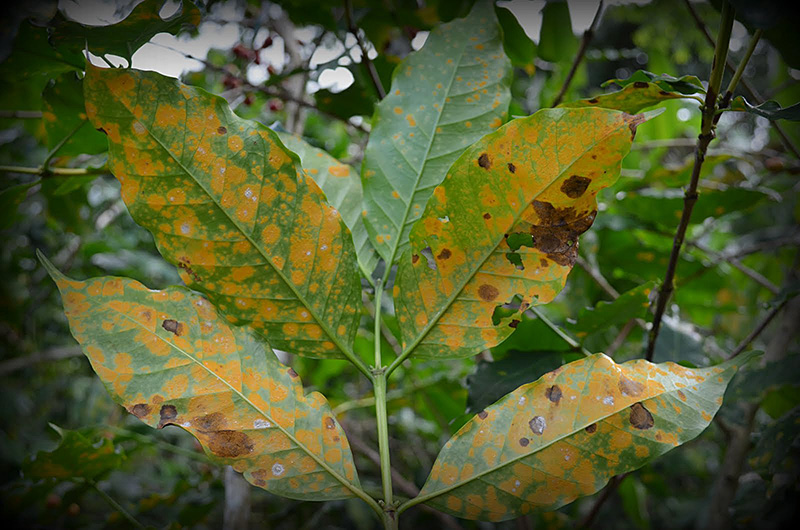
These coffee leaves are covered in coffee leaf rust, a fungal pathogen that leads to defoliation and reduced yields. Without proper management, coffee leaf rust can spread quickly and threaten coffee crops around the world, warns Purdue University mycologist Cathie Aime. (Photo courtesy of Cathie Aime)
The COVID-19 pandemic is likely to cause a “severe production crisis” as a complex web of socio-economic factors make conditions worse for smallholder coffee farmers, according to groundbreaking new research.
The report — led by researchers at Rutgers University, Purdue University, the University of Hawaii, CIRAD, Santa Clara University, and the University of Exeter — explored the leaf rust outbreaks in the Americas over the past decade, plus other recent outbreaks of the crop-killing disease.
It found links between poor socio-economic conditions, the subsequent lack of investment in coffee farms, the increased incidence of leaf rust and worsened conditions for farmers and other vulnerable actors in the coffee chain.
The paper concludes that further socio-economic disruptions caused by the COVID-19 pandemic — such as impacts on labor and reductions in sustainable investments — are likely to create long-term shocks that threaten global production levels and may ultimately increase costs for consumers.
Related Reading
- The Lasting Impact of Coffee Leaf Rust: Past, Present and Future in the Fight Against Fungus
- With a Disrupted Coffee Value Chain, Collaboration is Needed to Help Save Specialty
- Opinion: The COVID-19 Pandemic Will Only Make the Price Crisis Worse
“Our paper shows that coffee leaf rust outbreaks are complex socio-economic phenomena, and that managing the disease also involves a blend of scientific and social solutions,” Kevon Rhiney, an assistant professor in the Department of Geography at Rutgers, said in an announcement of the paper’s publication in the journal Proceedings of the National Academy of Sciences. “There is no ‘magic bullet’ that will simply make this problem disappear. Addressing coffee leaf rust involves more than just getting outbreaks under control; it also involves safeguarding farmers’ livelihoods in order to build resilience to future shocks.”
The paper notes that many of the existing efforts in the coffee sector to eradicate leaf rust involve the development and proliferation of rust-resistant varieties. However, the researchers underscore the notion that existing power and risk dynamics in the global coffee sector will continue to threaten smallholder farmer livelihoods.
The research points to the 2008 recession as an example of what can happen when the industry becomes disengaged with the financial needs of producers. It draws a direct line between the 2008 recession — and resulting downward shift in demand — that led to lower prices for coffee farmers, which was followed by farm abandonment or reduced investment in farm management.
“Resource-constrained coffee farmers subject to these conditions often experience a self-reinforcing feedback loop in which falling profits lead to reduced plant care,” authors of the study wrote. “This sets the conditions for CLR to proliferate, resulting in further loss, and reduced profitability.”
The research further suggests that events such as the COVID-19 pandemic serve to reveal existing problems in the coffee sector, rather than merely creating new ones.
“The spread of COVID-19 and coffee leaf rust both reveal the systemic weaknesses and inequalities of our social and economic systems,” Rhiney said.
The paper states: “We can thus only have a healthy coffee system by building up the well-being of the most vulnerable. It is critical to recognize the key roles of labor and healthy functioning ecosystems in producing and sustaining profits. This means challenging the status quo and the current coffee value chains to better recognize the value produced by small-scale producers, while at the same time uplifting essential but under-recognized parts of the production process, such as human health, food security and sustainability.”
Nick Brown
Nick Brown is the editor of Daily Coffee News by Roast Magazine.
Comment
1 Comment
Comments are closed.






Comment on the photo depicting coffee leaves covered with rust spores. There are white spots on the infection. This is the hyperparasite Lecanicillium lecanii which should be given more attention as a natural rust control. How about publishing an article about Lecanicillium lecanii? Thank you!